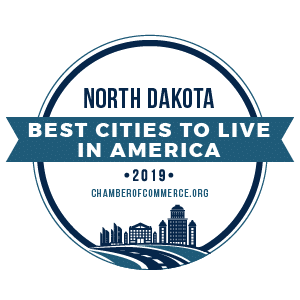Moving to North Dakota? Check out our guide to Starting a Business in North Dakota.
There are plenty of reasons to move to North Dakota. While the rest of the nation was recoiling in the wake of the 2008 recession, North Dakota’s economy was chugging along, spurned by ambitious oil exploration and expansion of the energy sector.
As the economy grew, it drew out-of-state workers along with it and North Dakota’s cities became some of the fastest growing in the country. If you are coming up in the energy industry (or in agriculture, as almost 90% of the state’s land is still devoted to farmland), few states hold better opportunities than the Roughrider State. Have a look at our top five best North Dakota cities to live in for more information on where to settle.
1. West Fargo
West Fargo is North Dakota’s best city to live in. Lauded for its vast swaths of parkland, terrific infrastructure, and safety, the city is steadily expanding and proves a great place to settle and raise a family in.
2. Fargo
Fargo is the largest city in the state and home to North Dakota State University. Once chosen by Forbes as the best small city to start a business or career, Fargo’s traditionally agriculture-based economy is expanding and diversifying into technology, food processing, and healthcare. The city is rife with opportunity for the young professional.
3. Bismarck
State capital Bismarck is #3 on the list. Like many of North Dakota’s cities, Bismarck is experiencing rapid development brought on economic expansion, but also provides many recreation opportunities, including a vast system of parks and quite a few theater companies.
North Dakota’s top five is filled out by Dickinson (#4), a once small, quiet city growing at a pace too fast for the census to keep up due to the recent oil boom, and Grand Forks (#5), the state’s third-largest city with a diverse economy and a host of cultural venues.
[table “95” not found /]Did your city make the list? Share the good news!
Feel free to share this badge of recognition. Please include attribution to https://www.chamberofcommerce.org/.
Methodology
We ranked a total of 2,509 qualified cities (those with populations above 25,000 and enough data for analysis) by five factors: employment (number of establishments, median earnings); housing (owner-occupied housing with a mortgage, monthly housing costs); quality of life (work commute, poverty levels); education (percentage with a bachelor’s degree or higher); and health (obesity ratios).


